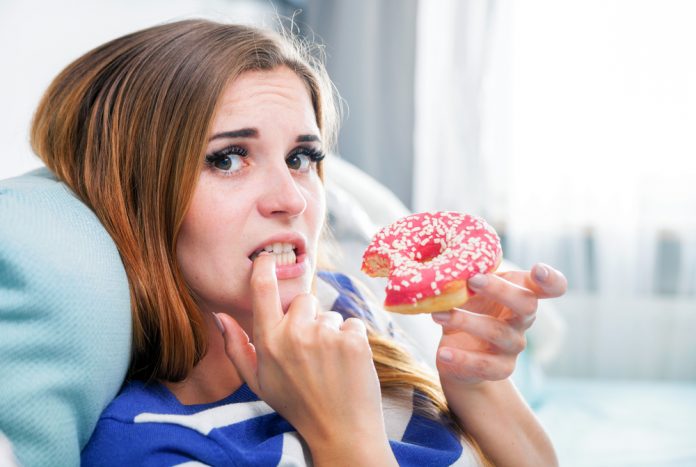Letting go and enjoying what you want is the healthiest food move you can make
In the United States, people have become more conscious of eating healthy to reduce the risk of obesity, high blood pressure, and type 2 diabetes.
Food shame is one unfavorable consequence of those healthful habits.
Food guilt is the term used to describe the tension and guilt that one feels after consuming particular meals. This can lead to poor eating habits, anxiety, and embarrassment.
Read on to learn more about food guilt and get tips to help stop it and restore a more balanced relationship with food.
What Is Food Guilt?
A person feels ashamed of what they’re eating when they suffer food guilt. Food guilt can have a negative emotional impact on people, particularly if they believe that a food’s nutritional content is detrimental to their health.
What Are Examples of Food Guilt?
Anecdotally, food guilt can come in various expressions. You might be experiencing food guilt if you:
Apologize about what you’re eating or how much you’re eating
Express food guilt by saying that you’re guilty about eating certain foods
Say something nasty about oneself, like, “I’m so gross,” before, during, or after meals.
Is It Typical To Feel Remorseful After Eating?
Eating food can occasionally make you feel guilty, which is normal. But feeling guilty about food all the time is not.
What people believe to be the rationale can influence how food guilt manifests itself. “As a society, we have wholeheartedly accepted the myth that we can attain the ideal body shape by eating the ‘right’ foods in the ‘right’ quantities,” Glenys Oyston,
RDN, a Texas-based dietitian, told Health. “We’re sure it’s just a matter of trying hard enough.”
Another reason a person might feel food guilt is that eating any “wrong” food isn’t merely unhealthy. Some people may associate eating “wrong” food with a failure of willpower.4
Other Feelings You May Have
When you categorize foods as good or bad, you might classify yourself as virtuous or not virtuous, strong or weak, worthy or unworthy. However, an inability to resist forbidden foods isn’t a moral failing; it’s how people are wired.
Dietitian Marci Evans, RDN, of Cambridge, Massachusetts, who specializes in assisting patients in recovering from eating disorders, told Health that “our brains react really strongly to restriction.”
“The more we say ‘No, bad’ about a food, the more we can’t stop thinking about it.
The list of “bad” items in society seems to have grown over time—gluten, red meat, everything packaged—to the point that individuals are now apologizing for even eating.
That thinking can happen even if your reasons for avoiding certain foods seem more concerned with health than weight.
For instance, persons who have digestive issues may abstain from dairy products yet choose to eat them after working out.
Oyston called that behavior “healthism,” stating that it’s just another manifestation of our diet mentality
Put differently, our perception of health is influenced by the behaviors or pursuits we identify with being slender.
Is Feeling Food Guilt an Eating Disorder?
There is evidence to show that eating disorders such as binge eating are influenced by shame.
An extreme concern over whether or not to restrict your consumption of a certain item can occasionally be a sign of a more serious eating disorder.
Another indication is obsessive exercise because you believe you’ve overindulged in food or the wrong kind of meals.
“Even if it never gets bad enough to be clinically diagnosable, it’s still a problem when your thoughts about food take up so much mental space that other parts obesity
your life start to suffer,” New York-based dietitian and intuitive eating counselor Christy Harrison, RD, said to Health. This issue could arise, for instance, if you obsess over a cuisine that is “off-limits” to the point that you miss out on the enjoyment that other guests are getting from a party.
How Can I Get Rid of Food Guilt?
It might not be simple to swiftly overcome eating guilt. Nevertheless, here are some pointers to get you started on the path of quitting eating guilt.
1. End the Apology Cycle
Find a way to break the pattern of apologizing if you find yourself apologizing for the food you’re eating. This could manifest as you becoming more conscious of your apology moments or the meals you link with your regrets.
Once you end it, you may find that you can enjoy what you consume more without shame—or at least with less of it.
I’ve discovered that, as I’ve gotten better at saying sorry aloud, my inner monologue has also been quieter.
The brownies are just brownies now
I can enjoy myself at a party while eating and loving them at the same time.
2. Find Ways To Help Others
You may find yourself being aware of when other people are expressing food guilt.
Dallas-based pediatric eating therapist Jenny McGlothlin provided Health with advice on how to manage awkward situations where others criticize their weight or food choices.
“Like if a friend says she’s ‘being bad,’ I’ll say, ‘Well, you’re pretty awesome, so anything you choose to eat can’t be bad!’”
3. Learn How To Eat Intuitively
As you learn to overcome food shame, you could also find that you eat more instinctively.
Eating intuitively is making food choices based on your body’s requirements and desires.
According to research, intuitive eating—which involves acting on your body’s cues about hunger and fullness—protects against eating disorders.

























